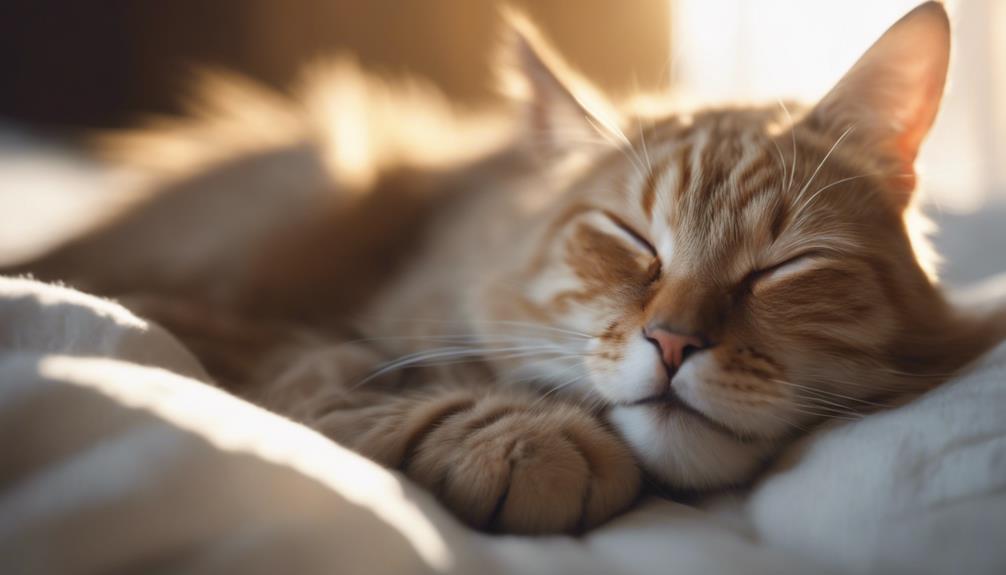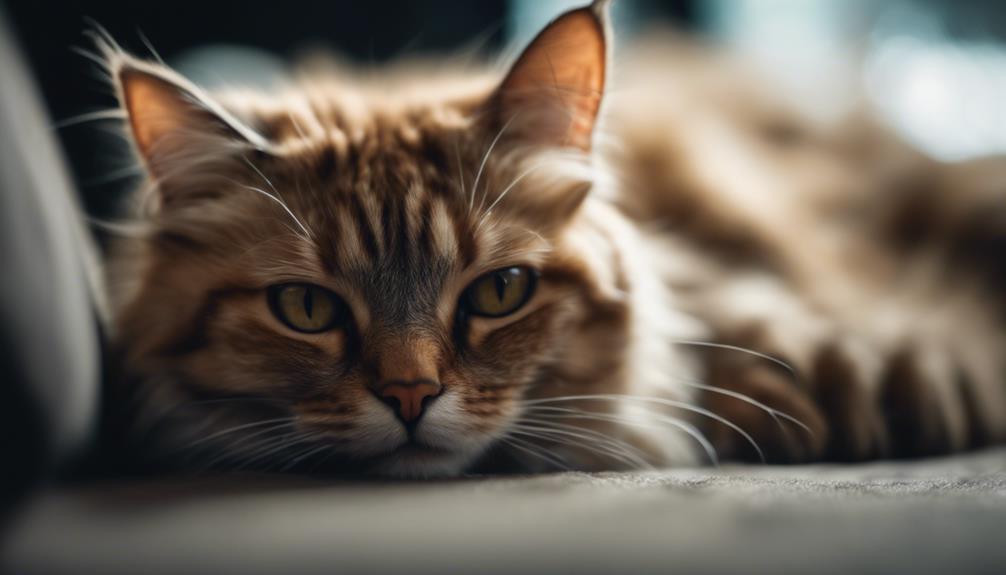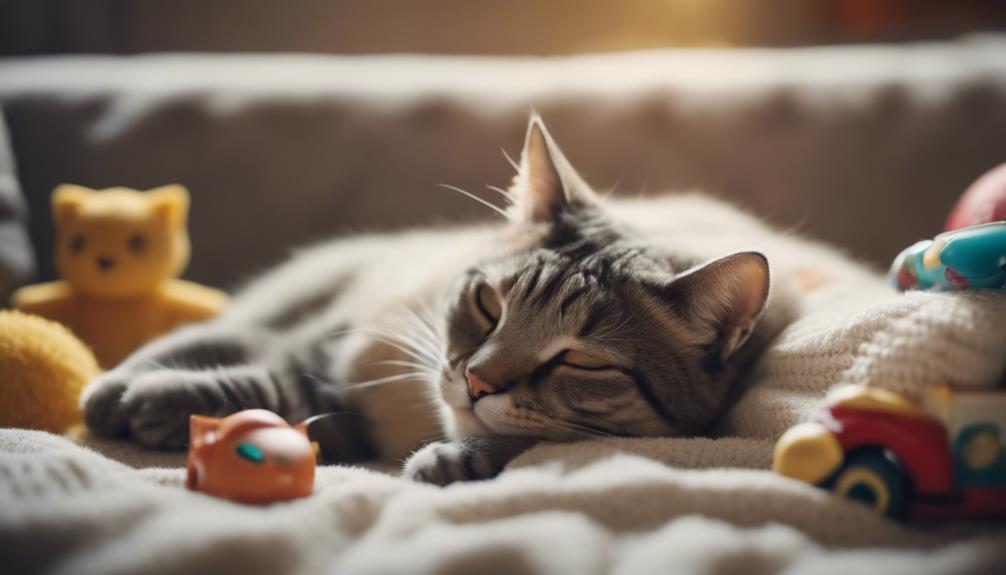Cats, known for their enigmatic behavior, often puzzle us with their seemingly endless slumber. While it may appear that our feline friends spend more time napping than prowling, the reasons behind this behavior are multifaceted and deeply ingrained in their nature.
From nocturnal instincts that harken back to their wild roots to the intricate interplay between rest and mental stimulation, the mystery of why cats sleep so much unveils a fascinating world waiting to be explored. Understanding the underlying motivations behind their extended periods of rest may offer a glimpse into the secret lives of our beloved companions.
Key Takeaways
- Cats sleep to conserve energy for hunting activities and manage their energy levels effectively.
- Lack of stimulation or activities may lead to increased sleep in cats.
- Stress, anxiety, or illness can cause cats to sleep more than usual.
- Sleeping up to 20 hours a day is normal for cats and crucial for their overall health.
Nocturnal Behavior
Cats exhibit a nocturnal or crepuscular behavior, which inclines them to be most active during the night and rest during the day. This behavior is rooted in their ancestral hunting instincts, where the cover of darkness provided an advantage for stalking prey.
While domesticated cats may not need to hunt for survival, this behavior remains ingrained. Their heightened senses, like superior night vision and acute hearing, make them adept nighttime hunters. Even indoor cats, shielded from the elements of the outdoors, often retain this nocturnal behavior, engaging in playful antics or prowling around the house during the night.
Understanding this natural inclination can help pet owners create a conducive environment that respects their feline companion's nocturnal nature.
Energy Conservation
In their natural habitat, felines exhibit a remarkable ability to conserve energy efficiently. Cats, as predators, have evolved strategies to conserve energy for hunting bursts. Resting is a key component of energy conservation for cats, allowing them to recharge and be ready for their next hunting opportunity.
The sleep/hunt cycle in cats is essential for managing their energy levels effectively. By resting and saving energy during periods of inactivity, cats can maintain their agility and sharp hunting skills. This behavior aligns with their instincts as efficient predators.
Understanding the significance of energy conservation in cats sheds light on why they may spend a significant portion of their day sleeping, ensuring they are prepared for moments of activity and hunting prowess.
Alertness During Rest

During periods of rest, felines exhibit a remarkable ability to remain alert, showcasing their innate vigilance and readiness for any potential stimuli. Even during short breaks or cat naps that are not deep sleep, cats can maintain a level of alertness that allows them to respond swiftly to their surroundings. This heightened sense of awareness is evident through their subtle movements, such as twitching ears or a flicking tail, indicating their constant state of readiness. Despite appearing to be asleep, cats are often in a state of readiness to react to any changes in their environment. This alertness during rest is a testament to cats' natural instincts and survival skills.
- Cats take short breaks or cat naps that are not deep sleep.
- Cats can remain alert with moving ears or tails, even with closed eyes.
- Cats may appear to be sleeping but are actually alert and ready to react.
- Felines exhibit a remarkable ability to remain alert during rest, showcasing their vigilance.
- Cats' heightened sense of awareness allows them to respond swiftly to their surroundings.
Boredom and Stimulation
Felines' need for mental stimulation and engagement becomes evident when observing their behavior in environments lacking enrichment or varied activities. Cats are naturally curious and intelligent creatures that thrive on mental and physical challenges.
When cats lack stimulation, they may resort to sleeping more as a way to pass the time. To combat boredom and engage cats, providing enrichment toys, puzzles, or interactive activities can be beneficial.
Building a catio, which is an enclosed outdoor space for cats, or offering a variety of toys that encourage play and exploration can help keep cats mentally stimulated and active. By addressing their need for stimulation, cat owners can help reduce excessive sleeping and promote a healthier and more fulfilling lifestyle for their feline companions.
Stress and Anxiety

Cats often exhibit increased sleeping behavior as a response to stress and anxiety.
Changes in the environment, such as moving or introducing new pets, can trigger stress in cats.
Cats may feel anxious due to loud noises, such as thunderstorms or fireworks.
Conflict with other animals or changes in routine can lead to heightened stress levels in cats.
Medical conditions, like urinary tract infections or dental problems, can cause anxiety and increased sleeping.
Providing a safe space, routine, and calming activities can help reduce stress and anxiety in cats.
Health and Comfort
The well-being and comfort of domestic cats are closely tied to their overall health and quality of life. Cats may sleep more when unwell or in pain, using rest as a way to cope with discomfort.
Changes in their sleeping patterns, such as sleeping more than usual or hiding away, can indicate underlying health issues that need attention. Overweight cats, in particular, may experience pain from conditions like arthritis, leading to increased periods of rest.
Monitoring any significant shifts in your cat's sleep habits and consulting a veterinarian if necessary is crucial to ensure they receive proper care and treatment for any health concerns that may be affecting their comfort and well-being.
Normal Sleep Patterns

Adequate sleep is essential for maintaining the overall health and well-being of domestic cats. Cats sleeping up to 20 hours a day is normal behavior, ensuring they recharge and stay healthy.
Here are key aspects of normal sleep patterns in cats:
- Cats require extended periods of rest to conserve energy for hunting activities.
- Adequate sleep helps cats manage their energy levels effectively.
- Short breaks or cat naps allow cats to stay alert even while resting.
- Consistent sleep patterns indicate a content and comfortable cat.
- Providing a healthy and enriched environment supports cats in following their natural sleep cycles.
Conclusion
In conclusion, cats' seemingly excessive sleep habits can be attributed to a combination of nocturnal instincts, energy conservation, and the need for mental stimulation.
While some may view their prolonged naps as laziness, it is essential to recognize the evolutionary and physiological factors at play.
By understanding and accommodating our feline companions' unique sleep patterns, we can ensure their well-being and happiness in our shared environment.sleep patterns in cats:often puzzle us with their seemingly endless slumber. While it may appear that our feline friends spend more time napping than prowling, the reasons behind this behavior are multifaceted and deeply ingrained in their nature.
From nocturnal instincts that harken back to their wild roots to the intricate interplay between rest and mental stimulation, the mystery of why cats sleep so much unveils a fascinating world waiting to be explored. Understanding the underlying motivations behind their extended periods of rest may offer a glimpse into the secret lives of our beloved companions.
Key Takeaways
- Cats sleep to conserve energy for hunting activities and manage their energy levels effectively.
- Lack of stimulation or activities may lead to increased sleep in cats.
- Stress, anxiety, or illness can cause cats to sleep more than usual.
- Sleeping up to 20 hours a day is normal for cats and crucial for their overall health.
Nocturnal Behavior
Cats exhibit a nocturnal or crepuscular behavior, which inclines them to be most active during the night and rest during the day. This behavior is rooted in their ancestral hunting instincts, where the cover of darkness provided an advantage for stalking prey.
While domesticated cats may not need to hunt for survival, this behavior remains ingrained. Their heightened senses, like superior night vision and acute hearing, make them adept nighttime hunters. Even indoor cats, shielded from the elements of the outdoors, often retain this nocturnal behavior, engaging in playful antics or prowling around the house during the night.
Understanding this natural inclination can help pet owners create a conducive environment that respects their feline companion's nocturnal nature.
Energy Conservation
In their natural habitat, felines exhibit a remarkable ability to conserve energy efficiently. Cats, as predators, have evolved strategies to conserve energy for hunting bursts. Resting is a key component of energy conservation for cats, allowing them to recharge and be ready for their next hunting opportunity.
The sleep/hunt cycle in cats is essential for managing their energy levels effectively. By resting and saving energy during periods of inactivity, cats can maintain their agility and sharp hunting skills. This behavior aligns with their instincts as efficient predators.
Understanding the significance of energy conservation in cats sheds light on why they may spend a significant portion of their day sleeping, ensuring they are prepared for moments of activity and hunting prowess.
Alertness During Rest

During periods of rest, felines exhibit a remarkable ability to remain alert, showcasing their innate vigilance and readiness for any potential stimuli. Even during short breaks or cat naps that are not deep sleep, cats can maintain a level of alertness that allows them to respond swiftly to their surroundings. This heightened sense of awareness is evident through their subtle movements, such as twitching ears or a flicking tail, indicating their constant state of readiness. Despite appearing to be asleep, cats are often in a state of readiness to react to any changes in their environment. This alertness during rest is a testament to cats' natural instincts and survival skills.
- Cats take short breaks or cat naps that are not deep sleep.
- Cats can remain alert with moving ears or tails, even with closed eyes.
- Cats may appear to be sleeping but are actually alert and ready to react.
- Felines exhibit a remarkable ability to remain alert during rest, showcasing their vigilance.
- Cats' heightened sense of awareness allows them to respond swiftly to their surroundings.
Boredom and Stimulation
Felines' need for mental stimulation and engagement becomes evident when observing their behavior in environments lacking enrichment or varied activities. Cats are naturally curious and intelligent creatures that thrive on mental and physical challenges.
When cats lack stimulation, they may resort to sleeping more as a way to pass the time. To combat boredom and engage cats, providing enrichment toys, puzzles, or interactive activities can be beneficial.
Building a catio, which is an enclosed outdoor space for cats, or offering a variety of toys that encourage play and exploration can help keep cats mentally stimulated and active. By addressing their need for stimulation, cat owners can help reduce excessive sleeping and promote a healthier and more fulfilling lifestyle for their feline companions.
Stress and Anxiety

Cats often exhibit increased sleeping behavior as a response to stress and anxiety.
Changes in the environment, such as moving or introducing new pets, can trigger stress in cats.
Cats may feel anxious due to loud noises, such as thunderstorms or fireworks.
Conflict with other animals or changes in routine can lead to heightened stress levels in cats.
Medical conditions, like urinary tract infections or dental problems, can cause anxiety and increased sleeping.
Providing a safe space, routine, and calming activities can help reduce stress and anxiety in cats.
Health and Comfort
The well-being and comfort of domestic cats are closely tied to their overall health and quality of life. Cats may sleep more when unwell or in pain, using rest as a way to cope with discomfort.
Changes in their sleeping patterns, such as sleeping more than usual or hiding away, can indicate underlying health issues that need attention. Overweight cats, in particular, may experience pain from conditions like arthritis, leading to increased periods of rest.
Monitoring any significant shifts in your cat's sleep habits and consulting a veterinarian if necessary is crucial to ensure they receive proper care and treatment for any health concerns that may be affecting their comfort and well-being.
Normal Sleep Patterns

Adequate sleep is essential for maintaining the overall health and well-being of domestic cats. Cats sleeping up to 20 hours a day is normal behavior, ensuring they recharge and stay healthy.
Here are key aspects of normal sleep patterns in cats:
- Cats require extended periods of rest to conserve energy for hunting activities.
- Adequate sleep helps cats manage their energy levels effectively.
- Short breaks or cat naps allow cats to stay alert even while resting.
- Consistent sleep patterns indicate a content and comfortable cat.
- Providing a healthy and enriched environment supports cats in following their natural sleep cycles.
Conclusion
In conclusion, cats' seemingly excessive sleep habits can be attributed to a combination of nocturnal instincts, energy conservation, and the need for mental stimulation.
While some may view their prolonged naps as laziness, it is essential to recognize the evolutionary and physiological factors at play.
By understanding and accommodating our feline companions' unique sleep patterns, we can ensure their well-being and happiness in our shared environment.




